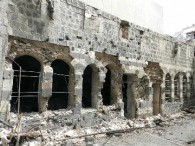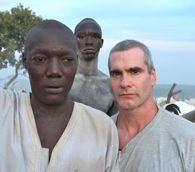Destination: Middle East
War-Torn Syria Courts Tourists. Really!
by Pam Mandel | 06.12.14 | 10:28 AM ET
Six sites in Syria are listed as World Heritage sites and 12 more have been nominated. The World Heritage Foundation lists Damascus as “the oldest capital of the world” and “the cradle of historical civilizations.” Descriptions of Syria’s other cultural wonders are equally lofty—Palmyra has been settled since prehistory, the minarets in Bosra are the oldest in the world. Little wonder travelers want to visit Syria. It’s a cultural crossroads rich in history, home to a spectacular array of archeological wonders. But there’s one minor issue with visiting the country: For about three years now, Syria has been in the grip of a devastating civil war.
This is no deterrent to the Syrian Ministry of Tourism (sorry, no link, their site sets off a virus warning). It launched a new campaign designed to convince travelers that Syria is a safe destination. The New Republic points out how Syria’s tourist sites have been affected by the conflict. For example:
In Homs, site of that fabled “prosperous tourist season,” Jabhat al-Nusra continues to carry out bombings that have left dozens dead. In Hama, the regime is encouraging tourism while it is allegedly using chemical weapons, especially chlorine gas
Homs was under siege by Bashar al-Assad’s government for nearly three years, The New Republic posits that a tourism campaign to the region is more about showing who’s in control than about improving the country’s devastated economy.
And this story on Fox describes the issues one might encounter when making a hotel reservation:
No one denies that logistics are difficult for holiday-makers. Hotel reservations, for example, can be iffy. The other day a band of foreign jihadists blew up Aleppo’s Carleton Citadel Hotel, drastically reducing the supply of five star accommodations in Syria’s fabled second city.
Difficult logistics indeed. The campaign overlooks the tragedy of nearly 10 million displaced Syrians. The cost of war on Syria’s precious historical sites is heartbreaking, but the toll on human lives is incalculable.
More than a decade ago, I was invited to tag along on a friend’s visit to Syria and I hesitated, nervous about my nationality, my gender, my religious upbringing. “Propaganda,” insisted my friend, “you’ll be fine.” The pro-tourism campaign is propaganda, too, of a very different kind. I prefer the other flavor. I might have needed a head scarf to show respect, but a flak jacket? Not so much so.
I deeply regret not going while I had the chance.
Welcome to the Baghdad Country Club
by Eva Holland | 12.27.11 | 2:41 PM ET
In The Atavist, Joshuah Bearman tells the fascinating story of the Baghdad Country Club, the only bar in the capital city’s fortified “Green Zone.” The bar was built and run by a mysterious British ex-military type, a contractor identified only as James. What intrigued me about the bar was the way in which it was both an escape hatch from the war and, at the same time, a place that was inextricably shaped by its surroundings. Here’s a taste:
In addition to tending bar alongside several Iraqi Christians, Heide manned the wholesale bottle shop that James and Ajax ran out of a guard shack on the property. The shelves stocked the finest spirits the pair could find, which sometimes meant actual quality, alongside gift-store items—T-shirts, mugs, and hats emblazoned with the BCC logo and motto: “It Takes Real Balls to Play Here.”
...Danny quietly managed the place: greeting patrons, dealing with staff, and running the kitchen. James wanted the menu to be good, which wasn’t easy. Whereas much of the food in the Green Zone was processed, packaged, shipped, and reconstituted, Ajax got fresh produce and meat for the kitchen. Danny got along well with Iraqis, and he made sure to serve the national dish of masgouf—fish with onion and pickles—alongside Western-style bruschetta, salads, and steaks. He brought in a chef named Dino to come up with recipes and marinades. Good fish was difficult to come by in Baghdad, but James knew a guy who knew a guy who could sometimes get trout flown in on Delta Force choppers. And Ahmed’s regular shipments of spirits kept the bar stocked for proper cocktails.
“We never hoped to get a Michelin star,” Danny says. “But we managed to give people the one thing you don’t have in Baghdad: a choice.”
The full (long) story is available for purchase from The Atavist—it comes in a variety of e-book formats. The Atlantic has a meaty excerpt. It’s a great read.
Interview with Henry Rollins: Punk Rock World Traveler
by Jim Benning | 11.02.11 | 12:40 PM ET
Jim Benning asks the musician about his new book of photographs and how travel has humbled him
The Hajj, in Photos
by Eva Holland | 11.16.10 | 2:12 PM ET
The annual pilgrimage to Mecca kicked off this week. The Big Picture has an absolutely stunning photo essay from the event.
World Travel Watch: Traffic Restrictions in Italy, Conflict on the Thai-Burmese Border and More
by Larry Habegger | 11.10.10 | 1:29 PM ET
Larry Habegger rounds up global travel news
A Tintin Tour of Jordan
by Eva Holland | 10.21.10 | 12:23 PM ET
The Guardian’s Georgia Brown made an unconventional trip to Petra—guided by a “Tintinologist” and a copy of The Red Sea Sharks. We’ve talked before about Tintin’s appeal to travelers, and in her dispatch Brown’s guide notes another aspect of that appeal:
Thousands of tourists visit Petra every week, but this summer I was part of the first small group of adventurers to arrive at the rose-red city in the footsteps of Tintin, led by one of the world’s leading Tintinologists, Michael Farr.
For Michael—who, dressed in beige linen suit and explorer’s hat, looks to have stepped from that golden era of travel—this is clearly part of the delight. A natural raconteur, he explains that Tintin creator Hergé’s drawings were astonishingly accurate, from his rendering of landscapes such as the Middle Eastern desert and local costumes, down to the accuracy of Egyptian hieroglyphs painted on a tomb or the Chinese lettering on a street banner. When fans of the comics see images of the real thing they perhaps cannot help but be reminded of the books in which they first saw them.
(Via The Book Bench)
Tony Blair Calls for Cooperation on Holy Land Tourism
by Eva Holland | 09.22.10 | 2:24 PM ET
The former British Prime Minister thinks that Israel and the West Bank are due for a “major joint marketing campaign” to promote the region’s many holy sites. Speaking at Conde Nast Traveler’s World Savers Congress, Blair suggested that tourism—and the revenue potential it offers—could be a “huge support” to the peace process in the area.
Middle East peace through biblical bus tours? Seems like it’d be worth a shot.
World Travel Watch: Commonwealth Games Concerns in India, Elections in Cuzco and More
by Larry Habegger | 09.22.10 | 12:46 PM ET
Larry Habegger rounds up global travel news
Interview with Michael Scott Moore: ‘Sweetness and Blood’
by Jim Benning | 09.08.10 | 12:32 PM ET
Jim Benning talks with the author of a new travel book about the spread of surfing around the globe
Studying Abroad in the Arabic-Speaking World on the Rise
by Michael Yessis | 08.12.10 | 1:56 PM ET
The numbers are still small-ish, but they’re growing fast. From the New York Times:
Between 2006 and 2007 the number of American students studying in Arab countries rose nearly 60 percent while China had only a 19 percent increase and England, 1.9 percent.
Many of the students are looking to gain a better understanding of the Arab world, and they’re also finding their experiences and Arabic-language skills are making them hot prospects for jobs.
Students in these programs are also writing some great travel stories.
Chinese Developers to Recreate Salvador Dalí‘s Hometown
by Michael Yessis | 08.11.10 | 12:06 PM ET
Xiamen Bay is the new Costa Brava! From the Guardian:
Sources at the company said they had found a spot that was geographically similar to Cadaqués, with its gently sloping hills and protected bay. “Building work will start in September or October,” a spokesman said.
More than 100 acres of land will be used to build a near replica with a capacity to house some 15,000 Chinese holidaymakers who want to enjoy the Costa Brava experience without having to travel 6,500 miles.
The Chinese version will not have the sparkling Mediterranean, the madness-inducing Tramontana wind or as many jellyfish as Cadaqués, but the promoters say they will try to get as close to possible to the real thing.
The developers are following in the footsteps of Lyon in the desert and Thames Town outside of Shanghai, among other places.
Dali would surely approve. As the Guardian notes, “One of his favourite money-making habits was to sign, and sell-off, blank sheets of paper for prints and lithographs. As a result, he is one of the most frequently copied and forged artists in the world.”
Maureen Dowd: ‘A Girl’s Guide to Saudi Arabia’
by Eva Holland | 07.07.10 | 1:41 PM ET
In the latest issue of Vanity Fair, the longtime New York Times columnist heads to Saudi Arabia to explore the country’s slowly growing tourism scene from a woman’s perspective. The story’s not online, but this VF Daily preview described it as “one part travel romp and one part history lesson—with a healthy dash of moxie thrown in.”
It’s already stirring up criticism—the comments on the preview are uniformly negative, questioning everything from the story’s tone to its accuracy regarding legal restrictions on women in Saudi Arabia. Dowd spoke to NPR about the experience earlier this week. A slideshow from the trip is also available online.
Cruise the Middle East with James A. Baker and Bill Moyers
by Jim Benning | 06.30.10 | 11:25 AM ET
You don’t see too many cruises with such an impressive roster of intellectual heavyweights aboard (with the notable exception, of course, of the historic 2007 “Gimme Three Days” Concert Cruise featuring Lynyrd Skynyrd and .38 Special).
It’s called the World Leaders Symposium Middle East. From the Abercrombie & Kent release that landed in my in-box this morning:
Abercrombie & Kent presents the World Leaders Symposium Middle East, an extraordinary journey through countries that remain a mystery to many Westerners, in the company of those who know it best, including former U.S. Secretary of State James A. Baker, III; former Egyptian first lady Jehan Sadat and veteran journalist Bill Moyers. Travel beyond the headlines on this once-in-a-lifetime trip (December 29, 2010-January 12, 2011) to engage in dynamic discussions with these and other experts who offer authoritative analysis and personal perspectives on the rich culture of the Middle East; the current political situation; and the ideas, people and possibilities shaping the future.
Designed for travellers who seek a deeper knowledge and appreciation of this complex region, this Marco Polo Club Invitational features a seven-night cruise aboard the luxurious ‘Silver Wind’ that originates in Dubai and includes stops in Kuwait, Saudi Arabia and Qatar.
Prices start at a cool $19,990.
Beyond the Separation Wall
by Alicia Imbody | 06.07.10 | 12:36 PM ET
Could a late night of Arak and hookah prompt Hasam to open up about life as a young Palestinian? Alicia Imbody wanted to find out.
Flurry of New Flights Landing in Iraq
by Eva Holland | 04.29.10 | 10:29 AM ET
The Independent rounds up the latest news from the country’s slowly-recovering travel industry. One thing worth noting, beyond the increasing availability of Iraq-bound flights from Western Europe? Apparently Iraq received more than a million tourists from the Middle East in 2008. Here’s hoping more travelers from outside the region can soon follow.
- « Prev Page
- Next Page »




